必修5Unit2教学设计
2019-2020学年高中英语unit2 the united kingdom sectionⅢgrammar教学案版本:人教版必修5
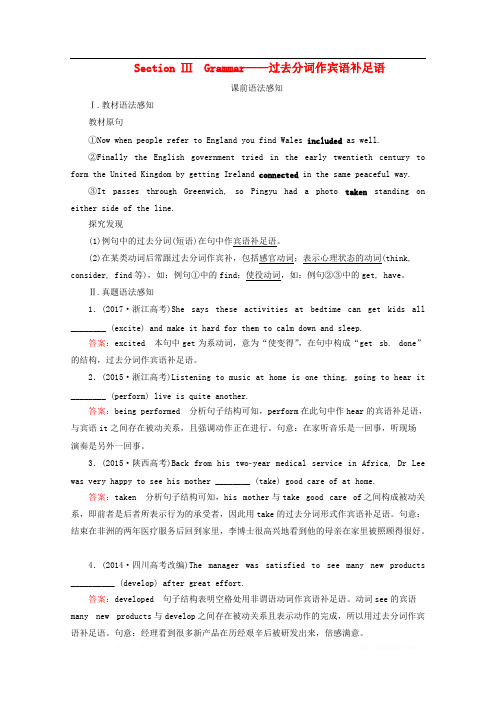
Section Ⅲ Grammar——过去分词作宾语补足语课前语法感知Ⅰ.教材语法感知教材原句①Now when people refer to England you find Wales included as well.②Finally the English government tried in the early twentieth century to form the United Kingdom by getting Ireland connected in the same peaceful way.③It passes through Greenwich, so Pingyu had a photo taken standing on either side of the line.探究发现(1)例句中的过去分词(短语)在句中作宾语补足语。
(2)在某类动词后常跟过去分词作宾补,包括感官动词;表示心理状态的动词(think, consider, find等),如:例句①中的find;使役动词,如:例句②③中的get, have。
Ⅱ.真题语法感知1.(2017·浙江高考)She says these activities at bedtime can get kids all ________ (excite) and make it hard for them to calm down and sleep.答案:excited 本句中get为系动词,意为“使变得”,在句中构成“get sb. done”的结构,过去分词作宾语补足语。
2.(2015·浙江高考)Listening to music at home is one thing, going to hear it ________ (perform) live is quite another.答案:being performed 分析句子结构可知,perform在此句中作hear的宾语补足语,与宾语it之间存在被动关系,且强调动作正在进行。
高中英语必修二《Unit 5 Music Section Ⅱ》优质教案
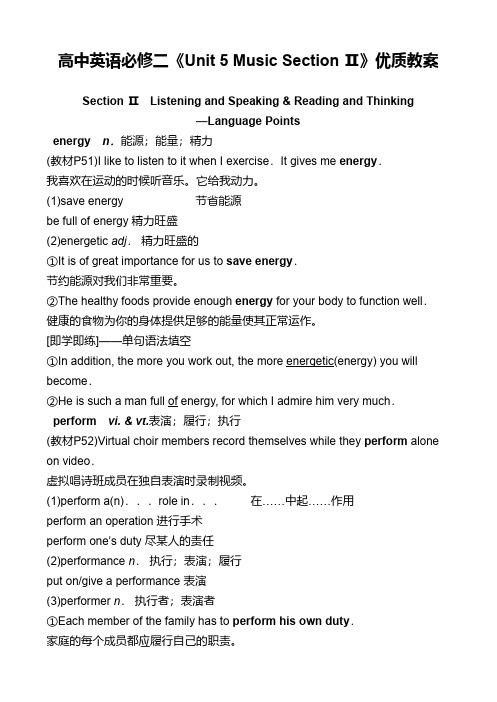
高中英语必修二《Unit 5 Music Section Ⅱ》优质教案Section Ⅱ Listening and Speaking & Reading and Thinking—Language Pointsenergy n.能源;能量;精力(教材P51)I like to listen to it when I exercise.It gives me energy.我喜欢在运动的时候听音乐。
它给我动力。
(1)save energy 节省能源be full of energy 精力旺盛(2)energetic adj. 精力旺盛的①It is of great importance for us to save energy.节约能源对我们非常重要。
②The healthy foods provide enough energy for your body to function well.健康的食物为你的身体提供足够的能量使其正常运作。
[即学即练]——单句语法填空①In addition, the more you work out, the more energetic(energy) you will become.②He is such a man full of energy, for which I admire him very much.perform vi. & vt.表演;履行;执行(教材P52)Virtual choir members record themselves while they perform alone on video.虚拟唱诗班成员在独自表演时录制视频。
(1)perform a(n)...role in... 在……中起……作用perform an operation 进行手术perform one’s duty 尽某人的责任(2)performance n. 执行;表演;履行put on/give a performance 表演(3)performer n. 执行者;表演者①Each member of the family has to perform his own duty.家庭的每个成员都应履行自己的职责。
高中英语必修5教案-Unit2
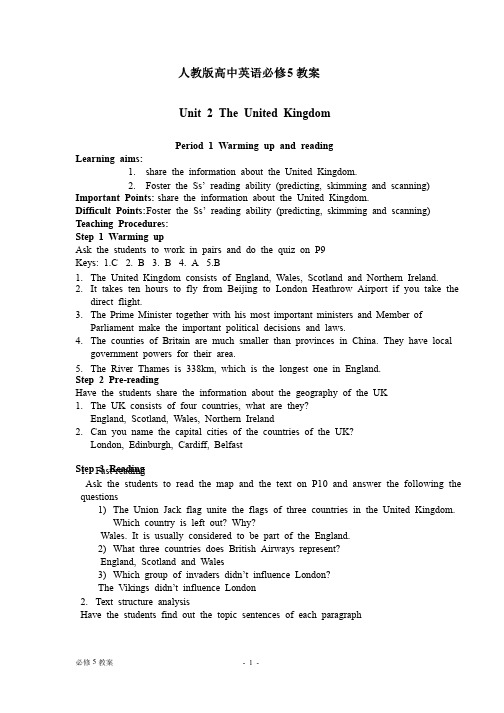
人教版高中英语必修5教案Unit 2 The United Kingdom Period 1 Warming up and readingLearning aims: 1. share the information about the United Kingdom. 2. Foster the Ss’ reading ability (predicting, skimming and scanning)Important Points: share the information about the United Kingdom. Difficult Points: F oster the Ss’ reading ability (predicting, skimming and scanning)Foster the Ss’ reading ability (predicting, skimming and scanning) Teaching Procedures: Step 1 Warming upAsk the students to work in pairs and do the quiz on P9 Keys: 1.C 2. B 3. B 4. A 5.B 1. The United Kingdom consists of England, Wales, Scotland and Northern Ireland. 2. It takes ten hours to fly from Beijing to London Heathrow Airport if you take the direct flight. 3. The The Prime Prime Prime Minister Minister Minister together together together with with with his his his most most most important important important ministers ministers ministers and and and Member Member Member of of Parliament make the important political decisions and laws. 4. The counties of Britain are much smaller than provinces in China. They have local government powers for their area. 5. The River Thames is 338km, which is the longest one in England. Step 2 Pre-reading Have the students share the information about the geography of the UK 1. The UK consists of four countries, what are they? England, Scotland, Wales, Northern Ireland 2. Can you name the capital cities of the countries of the UK? London, Edinburgh, Cardiff, Belfast Step 3 Reading 1. Fast-reading Ask the students to read the map and the text on P10 and answer the following the questions 1) The Union Jack flag unite the flags of three countries in the United Kingdom. Which country is left out? Why? Wales. It is usually considered to be part of the England. 2) What three countries does British Airways represent? England, Scotland and Wales 3) Which group of invaders didn’t influence London?The Vikings didn’t influence London2. Text structure analysis Have the students find out the topic sentences of each paragraph 1st paragraph Why are different words used to describe England, Wales, Scotland and Northern Ireland? 2nd paragraph First there was England. 3rd paragraph Great Britain was the name given when England and Wales were joined to Scotland. 4th paragraph The four countries are still very different. 5th paragraph England is the largest of the four countries. 6th paragraph The greatest historical treasure of all is London. 3. Careful reading Ask the students to divide the passage into three parts and write down the main idea of each part Part1 (para1-4) What What the UK includes the UK includes and how the UK formed and more detailed information about the four countries in the UK Part2 (para5) The geographical division of England into three zones: their similarities and differences Part3(para6) The cultural importance of London Task 1: Have the students put the events happening to the form of the UK into the right order. Task 2:Have the students identify the invaders and their influences on The United Kingdom Kingdom——the UK. The The Romans Romans Romans in in the 1st century AD The The Anglo-Saxons Anglo-Saxons Anglo-Saxons in in the 1060s The Vikings The Normans Towns and roads Language and government V ocabulary and place-names Castles Castles and and and words words words for for food Task 2: Have the students look at the map of England and Wales. Draw lines across to show the zones of the South, Midlands and North of England. North: Leeds, York, Sheffield, and Manchester Midlands: Coventry, Birmingham South: Reading, London, Brighton, Plymouth Step 4 Group discussion Answer the questions (Finish exercise 2 on Page 3) 1. John Snow believed Idea 2 was right. How did he finally prove it? (John Snow finally proved his idea because he found an outbreak that was clearly related to cholera, collected information and was able to tie cases outside the area to the polluted water.) 2. Do you think John Snow would have solved this problem without the map? First First there there there was was England. In In the the the 1313th century century AD, AD, Wales was linked to England. In 1603 England and Wales were joined to Scotland. The name Great Britain came into being. Three centuries later Northern Ireland joined with England, Wales and Scotland to become the United Kingdom.(No. The map helped John Snow organize his ideas. He was able to identify those households that had had many deaths and check their water-drinking habits. He identified those houses that had had no deaths and surveyed their drinking habits. The evidence clearly pointed to the polluted water being the cause.) 3. Cholera is a 19th century disease. What disease do you think is similar to cholera today? (Two diseases, which are similar today, are SARS and AIDS because they are both serious, have an unknown cause and need public health care to solve them.) Step 5 SummaryHave the students use the information to write a short summary of the passage Possible Possible version: version: version: The The The writer writer writer examines examines examines how how how the the the UK UK UK developed developed developed as as as an an an administrative administrative unit. It shows how England is also divided into three zones. It explains why London became the cultural capital of England. Period 2&3 Language focusLearning aims:T o help students learn to use some important words and expressions To help students learn to use some important words and expressions Important Important Points:To Points:To Points:To help help help students students students learn learn learn to to to remember remember remember some some some important important important words words words and and expressions Difficult Points:To help students learn to use some important words and expressions Teaching Procedures:Warming up Consist of 由…组成,由….构成(不用进行时)构成(不用进行时)The team consists of one hundred men and women athletes. =The team is made up of one hundred men and women athletes. There is a big family, consisting of ten people. 拓展:拓展:Consist in 在于,决定于在于,决定于 (不用被动态)= be based on/ depend on/ upon What does happiness consist in? 什么才算是幸福?什么才算是幸福?The beauty of the town consists in the style of its ancient buildings. Pre-reading divide “把…..分成;分开”指将一个整体分成若干部分,常与介词 between ,among, by ,into 等搭配等搭配He divided the cake into three= The cake was divided into three. Divide this line into 20 equal parts. Divide this line in half. We’ll have to divide the work between (among) us.6 divided by 3 is 2. 辨析:separate 多指把原来连在一起或者是靠近的人或事物分离开,常与介词多指把原来连在一起或者是靠近的人或事物分离开,常与介词 from, by 搭配搭配The Channel separates England from France. The two towns are separated by the river. She doesn’t want to be separated from this man.I have got separated from him for a couple of years. 分开,分居分开,分居Reading 1. puzzle n something that is difficult to understand or explain 难题,迷/ 益智玩具(游戏) Programming is really a puzzle to me. 我搞不懂编程。
高中英语 Unit2 The United Kingdom--period1教案 新人教版必修5 教

Unit 2 The United Kingdom教学资源说明Section 1 Background 背景围绕单元话题“联合王国”我们提供了若干实用性背景材料。
这些材料既可以作为教师教学参考材料为教师所用,也可以直接或改写、重组后作为课堂内外的拓展性阅读材料呈现给学生。
Section 2 Explanation 解析重点针对“阅读课型”中的课文难句,我们提供了详尽的,就句论句的解析和翻译,并且以解析的焦点话题为线索,进行了一定的归纳、辨析和总结,以帮助教师更好地实施“语言形式”的教学。
Section 3 Vocabulary 词汇按照课本单元词汇表顺序,我们重点提供动词、短语搭配的讲解。
所提供的例句,经典、地道、实用、易懂,完全可以直接用于教学。
第三部分教学测评说明围绕单元词法、句法项目,我们提供了长短不一的“单元教学测评”,并备有参考答案供教师使用。
有些测评题目直接源于历年高考试卷,更具有说服力和实用性。
Part 1 Teaching Design第一部分教学设计Period 1 A sample lesson plan for reading(PUZZLES IN GEOGRAPHY)IntroductionIn this period, after the warming up, students willfirst be guided to answer questions about UK. Then theyshall be helped to read the text Puzzles in geographyby the following procedures: reading aloud the text,reading and underlining, reading and circling, readingfor type of writing and summary of the ideas, makinga chain of events happening to The United Kingdom—the UK, reading to list invaders and their influences on The United Kingdom—the UK, transforming information. And the period will be closed down by students taking a quiz.Objectives■To help students learn to see language difficulties in munication■To help students learn to read an exposition about the UK■To help students better understand “the UK”■To help students learn to use some important words and expressions■To help students identify examples of “The past participle <2>as the object plement” in the textFocusAidsMultimedia facilities, tape-recorder, photos, diagramsProcedures1. Warming up⑴Warming up by sharing informationToday we are to learn about the United Kingdom. What do you know about it?Look at the photos and listen to me telling you about it.⑵Warming up by brainstormingGood morning, class. We shall take Unit 2 The United Kingdom today. But first let’s have a brainstorming. What occur to you ifyoue cross the United Kingdom?⑶Warming up by watching a video showHello, class! I am your travel guide today. We shall go to visit London for this weekend. Now let’s watch a video show about London attractions first. You may alsoread the caption in English.(For detailed information, go to: )2. Pre-reading by answering questionsSince you have learned something about the U.K., you are to answer the three questions about her on page 9.3. Reading⑴Reading aloud the textNext we are to read aloud the text to the recording. Pay attention to the pauses found in the sentences. You may slash the sentences into parts, that is, the sense groups.⑵Reading and underliningYou are to read the text the second time. This time you have to underline all the expressions found in the sentences. Copy them into your Expression Book after school and write a short passage, making use of the expressions.⑶Reading and circlingNext you are to read the text once again to circle all the cohesive words used to link the sentences and paragraphs together.⑷ Reading for type of writing and summary of the ideas⑸ Making a chain of events happening to The United Kingdom—the UK⑹ Reading to list invaders and their influences on The United Kingdom—the UK⑺Transforming informationYou are to go over the text again to look for any necessary information to pletethe form below.4. Closing down by taking a quiz。
2021年秋英语译林牛津必修5学案Unit2TheenvironmentWordpower

Unit 2 The environmentWord power: Discussing the environmentLearning aims:1. To make the students understand and master words related to the environment.2. Better understand environmental problems.Step 1 Lead-in1. Show some pictures to the students and introduce the topic.Do you know when the following festivals are?•National Tree-Planting Day _____•World Water Day ______________•World Environment Day _______________•World Oceans Day ____________•International Biodiversity Day _____________2. Environmental problems are discussed quite frequently in the news. A whole vocabulary has developed to help us talk about the environment and problems related to it.Step 2 Part A1. Do you love travelling? Where did you usually live?Have you ever heard of Ecoville?2. Task ARead the following leaflet about a new hotel which is friendly to the environment.Ecotourists are people who visit an area and don not harm or damage the ecosystem. They are interested in environmental protection. If you are this kind of tourist, you will love Ecoville. We use natural, safe energy from the sun, solar energy, instead of digging up Earth to find fuels, such as coal and oil. Nothing in our hotel causes pollution. We even use eco-friendly washing powder to wash your sheets. Don’t have your next holiday in a city full of factories that create harmful waste. Come to Ecoville, where you and the Earth will be safe together.3. Learn the following words. Match them with the definitions.Step 3 Part B1. The words above are called compound words .When we talk about things that are bad for the environment, many of the words that we use are compound nouns.2. Guess the meaning of following words, and match them with pictures.•clear-cut logging •acid rain•slash and burn farming •global warming3. Task BUse the compound nouns in the box to label the pictures below. [1]___________________[2]____________________[3]_____________________[4]_ __________________Step 4 Task CHelp Ecoville to write an ad. Fill in the blanks with words you learnt just now.Ecoville, the perfect holiday destination!The idea behind our hotel is (1) ______________ protection. It is safe and fun for the whole family, even Mother Earth!Ecoville was created by Li Zheng, a scientist. He was worried about (2) ___________. He wanted a chance to have a holiday in a beautiful part of the world, but not to cause damage to the (3)________ _ of the area. One night he saw a television show about a village in Africa. The whole village uses(4)_______________ _ from the sun. No (5)______ are burnt in people’s homes. There is no harmful waste from the factories because it is changed back into fuel and used to power the factories.Mr. Li was very excited about this idea, and decided to build Ecoville exactly the same way. Nothing you find in Ecoville causes any harm at all. We built our hotel around the trees----you can relax and be sure that there was no damage done to make space for your room. We even checked to make sure that the materials we used to build were (6)_____________________.So, come and join us, become part of the new generation of tourists, (7)_________, and spend your next holiday in beautiful Ecoville!Step 5 Task D1. The prefix ‘eco-’ means ‘earth’, which comes from Greek.It is used in many words to talk about the environment, such as ‘ecology’ and ‘eco-tourism’.E.g.•If factories harm the environment, they have to pay ____2. Work in groups & have a competition on words that include the prefix ‘eco-’. Use your dictionary if necessary.Homework:1.Review and make as many as words using ‘eco-’ .2.Preview Grammar part.Keys:Step 1 Lead-in1. Show some pictures to the students and introduce the topic. Do you know?•National Tree-Planting Day (12 Mar.)•World Water Day (22 Mar.)•World Environment Day (June 5th )•World Oceans Day (8 Jun. )•International Biodiversity Day (29 Dec.)2. Environmental problems are discussed quite frequently in the news. A whole vocabulary has developed to help us talk about the environment and problems related to it.Step 2 Part A1. Do you love travelling? Where did you usually live?Have you ever heard of Ecoville?2. Task ARead the following leaflet about a new hotel which is friendly to the environment.Ecotourists are people who visit an area and don not harm or damage the ecosystem. They are interested in environmental protection. If you are this kind of tourist, you will love Ecoville. We use natural, safe energy from the sun, solar energy, instead of digging up Earth to find fuels, such as coal and oil. Nothing in our hotel causes pollution. We even use eco-friendly washing powder to wash your sheets. Don’t have your next holiday in a city full of factories that create harmful waste. Come to Ecoville, where you and the Earth will be safe together.3. Learn the following words. Match them with the definitions.Step 3 Part B1. The words above are called compound words.When we talk about things that are bad for the environment, many of the words that we use are compound nouns.2. Guess the meaning of following words, and match them with pictures.•clear-cut logging•acid rain•slash and burn farming•global warming3. Task BUse the compound nouns in the box to label the pictures below.[1]___ acid rain[2]____ clear-cut logging[3]___ global warming[4]_ slash and burn farmingStep 4 Task CHelp Ecoville to write an ad. Fill in the blanks with words you learnt just now.Ecoville, the perfect holiday destination!The idea behind our hotel is (1) _environmental protection. It is safe and fun for the whole family, even Mother Earth!Ecoville was created by Li Zheng, a scientist. He was worried about (2) _pollution. He wanted a chance to have a holiday in a beautiful part of the world, but not to cause damage to the (3)_ ecosystem _ of the area. One night he saw a television show about a village in Africa. The whole village uses (4)__ (solar) energy _ from the sun. No (5)_ fuels are burnt in people’s homes. There is no harmful waste from the factories because it is changed back into fuel and used to power the factories.Mr. Li was very excited about this idea, and decided to build Ecoville exactly the same way. Nothing you find in Ecoville causes any harm at all. We built our hotel around the trees----you can relax and be sure that there was no damage done to make space for your room. We even checked to make sure that the materials we used to build were (6)_ Eco-friendly.So, come and join us, become part of the new generation of tourists, (7)_ ecotourists, and spend your next holiday in beautiful Ecoville!Step 5 Task D1. The prefix ‘eco-’ means ‘earth’, which comes from Greek.It is used in many words to talk about the environment, such as ‘ecology’ and ‘eco-tourism’.E.g.•If factories harm the environment, they have to pay eco-taxes_2. Work in groups & have a competition on words that include the prefix ‘eco-’. Use your dictionary if necessary.。
高中英语必修五第二单元教案
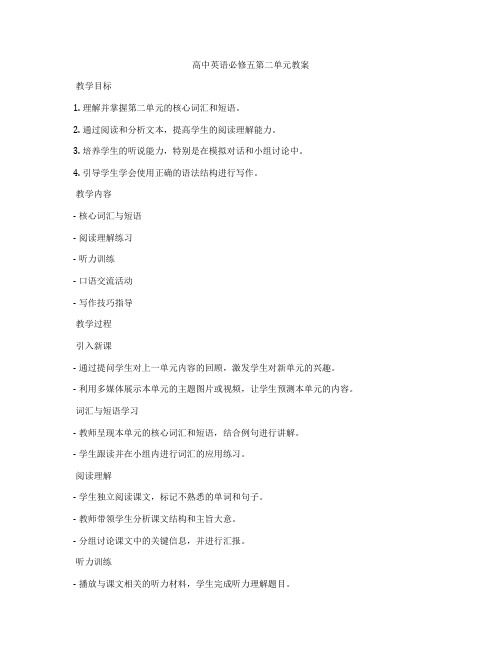
高中英语必修五第二单元教案教学目标1. 理解并掌握第二单元的核心词汇和短语。
2. 通过阅读和分析文本,提高学生的阅读理解能力。
3. 培养学生的听说能力,特别是在模拟对话和小组讨论中。
4. 引导学生学会使用正确的语法结构进行写作。
教学内容- 核心词汇与短语- 阅读理解练习- 听力训练- 口语交流活动- 写作技巧指导教学过程引入新课- 通过提问学生对上一单元内容的回顾,激发学生对新单元的兴趣。
- 利用多媒体展示本单元的主题图片或视频,让学生预测本单元的内容。
词汇与短语学习- 教师呈现本单元的核心词汇和短语,结合例句进行讲解。
- 学生跟读并在小组内进行词汇的应用练习。
阅读理解- 学生独立阅读课文,标记不熟悉的单词和句子。
- 教师带领学生分析课文结构和主旨大意。
- 分组讨论课文中的关键信息,并进行汇报。
听力训练- 播放与课文相关的听力材料,学生完成听力理解题目。
- 讨论听力材料中的关键信息,并与课文内容进行对比。
口语交流- 设计情景模拟对话,让学生运用所学词汇和表达进行角色扮演。
- 开展小组讨论,鼓励学生就相关话题发表自己的见解。
写作技巧指导- 分析范文,指出好的句型和段落结构。
- 学生根据给定主题,运用所学知识撰写短文。
- 教师对学生的作文进行点评,提出改进建议。
课堂小结- 总结本节课所学的重点词汇和语法点。
- 强调阅读理解和听力训练的重要性,鼓励学生在日常学习中多加练习。
- 提醒学生准备下一节课的预习内容。
作业布置- 完成课后的词汇和语法练习题。
- 阅读额外的英文文章,提高阅读量。
- 准备一个小组讨论,主题与本单元内容相关。
人教版高中英语必修5课件:Unit2 Warming up (共29张PPT)
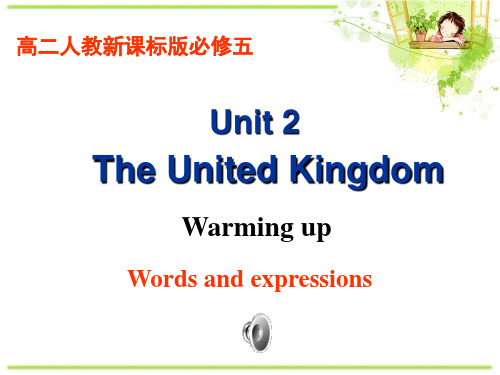
Northern Scotland Ireland
the United Kingdom
England Wales
2. How long does it take to fly from Beijing to London Heathrow Airport? B A. About six hours. B. About ten hours. C. About sixteen hours.
The national flag of the UK is called the Union Jack.. The official language is English. The capital city of the UK is London. Tony Blair is the Prime Minister and his office is located in Downing Street. Now let’s enjoy more pictures.
5. Which is the longest river in England? B
A.
B.
The River Avon The River Thames C.
The River Severn
6. Which is the national flag of the UK?
A.
B.
C.
C
7. Which is the national flower of the UK?
高二人教新课标版必修五
Unit 2
The United Kingdom
Warming up
Words and expressions
When you mention England, what or who will you think of?
新课标英语必修5 Unit2 The United Kingdom教学设计

及短语 ; 掌握过 去分 词作 宾补 , 并能 熟练 根据语 境
进行选 择 。 过 程与方 法 :
通 过播放英 国国歌…
Go a et e u e , dS v h en q
化并加 深 以上短 语 的使用 正确 率 。
() 2 已掌握 过 去 分词 作 定 语 和 表语 的 相关 知 识, 了解过 去分 词 的概 念 , 能根 据对 过去分词 的理 解找 出 R a ig中运用 过去 分词 的现象 。 edn
一
、
教 材 内 容
中过去 分词作 宾 补 的功 能 , 学 生体 会 到 所谓 的 让
语 法现 象也 是为 语 言 的 表 达 服务 的 , 而 培养 学 从 生间相 互交 流 , 动手 , 动脑 的好 习惯 。
( ) 习 内容 与 学 习 任 务 说 明 二 学
二 、 习 目标 与 任 务 学
收稿 日期 : 0 O 1 一8 2 1 一O 2
( ) 索英 国 的组 成 及 其 发 展 简史 并 了解 其 1探
国旗 的来 历 : 国的 组成 、 国 国旗 的来 历 、 国 英 英 英
基 金项 目 : 家 教 师 科 研 基 金“ 一五 ” 题“ 中课 堂 实 效 性研 究” C 0 0 4 ) 国 十 课 高 ( TF 6 2 8 作者 简 介 : 秋 菊 ( 9 1 浦 1 8 一 ) 女 , 南 昭通 人 , , 云 中学 一级 教师 , 士 , 要 从 事 高 中英 语 教 学 及 课 堂 教 学 有 效 性 研 究 。 学 主
四 、 学 内容 与 学 习水 平 的 分 析 与 确 定 教
引人本 文 ; 再启 发 同学 口头表 达 其 对 英 国 的 了解 情况 ; 过幻灯 片 的 播 放 完善 同学 对 英 国 了解 的 通
- 1、下载文档前请自行甄别文档内容的完整性,平台不提供额外的编辑、内容补充、找答案等附加服务。
- 2、"仅部分预览"的文档,不可在线预览部分如存在完整性等问题,可反馈申请退款(可完整预览的文档不适用该条件!)。
- 3、如文档侵犯您的权益,请联系客服反馈,我们会尽快为您处理(人工客服工作时间:9:00-18:30)。
Instructional DesignUnit 2 The United KingdomI. Analysis of the StudentsThe target students are in grade two of senior high school and about 17 years old, who’ve got certain amount of words, knowledge and are capable of communicating and expressing in English on some topics. The students are capable of finishing the tasks of reading text under the direction of the teacher.II. Analysis of the MaterialThis is the second unit of New Senior English for China Students book 5 which titled The United Kingdom. As we all know, the UK is an English-speaking country, which is the mother-land of English that students are studying now. Because of this very reason of such relationship, to study the geography, history and culture of the UK appears very important. It could arouse students’ interes ts to learn more and help to broaden their horizon towards the world. In this unit, the reading passage is the most important part, including the reading skills and moral aims that students have to obtain besides its knowledge requirement.III. Teaching Aims and DemandsA. Knowledge Aims▲ Have a basic understanding of geography, history and culture of the UK.▲ Learn the useful words and expressions in the text.B. Ability Aims▲ Talk about the United Kingdom▲ Tal k about language difficulties in communication.▲ Talk about space, position, direction and distance▲ Learn to use the past participle as the object complement▲ Learn to write a non-chronological report: tourist guideC. Feelings and Attitudes▲Have an enduring attention on learning different reading skills, and try to conquer the difficulties appear on the reading task.▲To widen students’ vision on the UK.▲The students will see the point of cooperative work.IV. Important and Difficult Point of TeachingA. Important Points1. Have a basic comprehension of the UK from geography, history, culture, etc.2. To manage the reading skills on various reading purposes.B. Difficult Points1. There are many difficult expressions and senten ces which impact students’comprehension of the passage.2. Distinguish the function and usage of different reading skills and able to applythem correctly and flexibly.V. Teaching AidsMultimedia, blackboard, and textbookVI. Teaching Methods1. Skimming and task-based activities.2. Having a discussion to help the students know something about the UK.3. Fast reading to get the general idea of the text.4. Careful reading to help the students understand some detailed information.5. Pair work to develop the students’ cooperative spirit and encourage them to speak English in class.VII. Teaching ProceduresStep 1 Word StudyStep 2 Warming up & Pre-Reading1. First ask students to finish the questions of Warming-up in five minutes alone.2. BrainstormingT: Now you have a chance to go to the UK, before you go there you’d better go to the library to search for some information about the country. What kind of information about it you want to find out?S: geography, literature, politics, sports, sightseeing, culture, ethnic groups, famous cities, food, history, language, fashion, life styles...T: How much do you know about these?3. Video for introduction of the UKTo play a video that introduces the UK in class.Step 3 Reading1. Fast reading.(1) Task 1: Question: What kinds of information are mentioned in the text?(sports, geography, history, flag, London, The biggest country is England,invasions)(2) Task 2: How many parts can this passage be divided into and what the main idea of each part is?Part 1 (para 1-4): How the UK came into being.Part 2 (para 5): England is divided into 3 zones.Part 3 (para 6): The reason why London became the cultural capital of England.2. Careful readingPart 1 (para 1-4)(1) T: Could you tell us how many countries the UK consists of and what they are?(The UK consists of four countries, they are England, Wales, Scotland and Northern Ireland.)(2) T: Exactly! Then does these four countries united in one day?(No)T: Then how can the UK come into being?(First there was only England, then in the 13th century AD, Wales was linked to England, and in 1603, the two were joined to Scotland to make the Great Britain come into being. Later, Northern Ireland was united to the Great Britain to form the UK.)T: Wonderful job! Actually the history can be shown in the national flag called the Union Jack.Cross of St George (England) Cross of St Andrew (Scotland)Cross of St Patrick (Ireland) Union Jack or Union Flag(3) T: By the way, you see, the flag Union Jack only unites England, Scotland andNorthern Ireland, with Wales left out. So do you know why?(Because it is usually assumed to be part of England)T: Yes! And according to the passage, although the four countries belong to the UK, they are still quite different in some aspects, so in what ways are the four countries different?(They are different in international relations. They have different educationaland legal systems as well as football teams.)Part 2 (para 5 )(1)T: Among the four countries, England is the largest, and for connivance it isdivided into 3 zones. What are they?(The South of England, the Midlands and the North)(2)T: Good! And now could you tell me what the feature of each zone?Most population settled in The South of England.Most of the large industrial cities are in the North and the Midlands.Many cities have famous football teams.Part 3 (para 6)(1)Then how do you understand the title of the text Puzzles in Geography? Are therereally any puzzles in geography of the UK? If so, what are they? If not, why does the writer use “Puzzles in Geography” as the title? Get the students to discuss about it in pairs.(2) Ask the students to fill in the following chart.Information about the UKCountries /Brief information from the textCapital ofUKEnglandWalesGreat BritainNorthernIrelandLondonIreland3. Summary of the textGo over the passage again significantly on the geographical position and historicalinfluence of the UK.4. Emphasize some important sentences, structures, expressions, grammar points. Step 4 Post-Reading1. Task 1: Role-playTwo students act as tourist guides, and two students act as the tourists who want to go to the UK. Before they start, they ask the guides some background information of the UK.2.Task 2: Discussion(1) What similarity is there between the invasions of the Romans and the Normans?(2) What similarity is there between the invasions of the Anglo-Saxons and theVikings?(3) Why does London only have evidence from three of the four invaders?(4) What geographical factors make it difficult to invade England successfully?Step 5 Exercise1.Ask the students to preview and try to finish the exercise—Learning aboutLanguage and Using Language(Reading, Listening)2.Pick out some important and difficult sentences in Sightseeing in London to helpthe students better understand the reading passage.Step 6 Homework1. Ask the students to do the exercises of Workbook on page 49-51.2. Ask the students to write a tour plan.VIII. Conclusion and EvaluationIn this unit we have talked about the UK. First, we get to know the culture, history, economy, and politics of the UK. Second, as for the grammar points, the teacher emphasizes the importance of Attributive Clause and Non-restrictive Attributive Clause, which are the hot pot in the College Entrance Examination. Third, during the teaching, students and teacher exchange their opinions well. However, there are several problems being exposed, such as a few students may act negatively while some are quite active, the teacher should give some “poor”students more opportunities to show themselves, build their confidence. Fourth, during the discussion the teacher should go around the classroom to look around each group’s task but not show his own idea to them. At last but not least, time management is very important in implementing the task-based language teaching activities, the teacher should be a good time manager and time keeper.。
